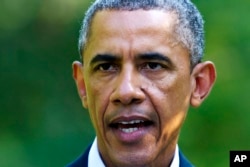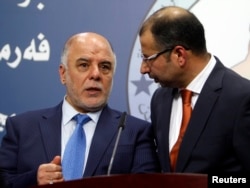President Barack Obama expressed support for the selection of a new candidate to replace Iraqi Prime Minister Nouri al-Maliki even as the longtime leader resisted efforts to unseat him, setting up a fierce power struggle as the government fights a rapidly advancing Sunni insurgency.
Iraqi President Fouad Massoum picked Haider al-Abadi, the deputy speaker of parliament, to lead the Baghdad government as it faces the onslaught of Islamic State militants who have overrun much of the country's northern and western territory.
Obama telephoned Abadi - a Shi'ite from Maliki's Dawa party - to offer congratulations, urging him to form an inclusive government that would secure representation for all of Iraq's major sects, including Sunnis and the Kurds.
The U.S. president called Abadi's nomination a "promising step forward" in this effort and in battling Islamic State insurgents who threaten the country’s stability.
"This new Iraqi leadership has a difficult task," Obama said, citing the challenge of regaining the confidence of Iraqis and the international community.
"We stand ready to partner with Iraq" and its new government, Obama said from Martha’s Vineyard in Massachusetts, "and build on today's progress."
He urged those working to form a new administration to come together peacefully with a goal of eliminating the threat of Sunni extremists.
Incumbent Prime Minister Maliki is resisting an end to his eight-year rule. Seeking a third term, he has defied calls from Sunnis, Kurds and some fellow Shi'ites to step aside for a less polarizing figure.
US Arms Kurdish Forces
Meanwhile, American officials said the United States has begun directly arming Kurdish peshmerga fighters who are battling the militants in what would be a deepening of the U.S. military involvement in Iraq.
The officials, who were not authorized to discuss the U.S. arms by name and spoke on condition of anonymity, said the weapons were supplied by the Central Intelligence Agency but that the Pentagon may soon begin arming the Kurdish fighters.
A Kurdish goverment official said the U.S. lethal aid is still not enough to battle the militants, even though peshmerga and other Kurdish forces were recently supplemented with similar munitions from Baghdad.
President Obama said Monday that U.S. aircraft remain in position to strike at extremists seeking to carve out a caliphate in the vast regions now under their control.
Obama, who had authorized airstrikes on the Islamic militants last week, said the U.S. had "stepped up" military advice to Iraqi and Kurdish forces.
The president noted the U.S. had continued airdrops of humanitarian supplies to the Iraqi religious minorities, especially Yazidis, trapped on Mount Sinjar. He also thanked the United Kingdom, France and other countries for providing aid.
Maliki resists move to replace him
Soon after Monday's nomination of Abadi, Maliki appeared on TV with members of his political bloc who insisted that they would not accept the nomination and that Maliki remained their choice for prime minister.
The designated prime minnister, Abadi, has 30 days to form a government.
He voiced optimism that the country eventually can defeat the Islamic State insurgents who are seeking to install an Islamic caliphate throughout the vast lands they have overtaken.
"I have confidence that, with the people and political blocs, we would be able to overcome this barbaric and savage attack on the Iraqi people and provide a good environment for the Iraqi people to live in,'' Abadi said.
Iraqis had been anticipating Abadi's nomination for weeks. The presence of key Shi'ite leaders at the ceremony inside Baghdad's Green Zone indicated strong support from other Shi'ites.
But high political drama preceded his appointment, as Iraqi media reported that security forces loyal to Maliki had deployed across Baghdad and surrounded the Green Zone.
Asharqiya TV reported that the president's security guards were on high alert to protect his residence as he nominated Abadi. Some Iraqi journalists had speculated that Maliki would attempt to stop the nomination.
In an address on Iraqi TV overnight, Maliki accused the Iraqi president of violating the constitution by delaying the nomination of a new prime minister. He appealed to Iraqi's Supreme Court to force Massoum to name his political bloc to form the new government because it had the most seats in parliament.
Al Arabiya TV reported that three out of eight Supreme Court judges had ruled in Maliki's favor in rapid consultation by telephone. However, the ruling was moot because Abadi is in fact a member of Maliki's alliance.
A parliamentary session to discuss a new Iraqi government has been postponed until August 19.
Critics said Maliki alienated Sunnis, prompting them to support Islamic State militants who have seized a large chunk of northern Iraq and have threatened to march on Baghdad, posing the biggest threat to Iraq since the fall of Saddam Hussein in 2003.
US, UN support
Abadi served as head of the Iraqi's finance committee, a political adviser to the prime minister and minister of communications. He was educated at the University of Manchester in England.
Ahead of the court ruling, the United States and United Nations expressed support for Massoum and the selection of a prime minister who will lead an inclusive new Iraqi government.
U.S. Secretary of State John Kerry, speaking Monday from Australia, where he and U.S. Secretary of Defense Chuck Hagel have arrived for a meeting in Sydney Tuesday, said Iraqis "need to know that there will be little international support of any kind whatsoever for anything that deviates from the legitimate constitutional process that is in place and being worked on now."
U.S. and Kurdish forces are attempting to blunt an offensive by Islamic State fighers that threatens to overrun Irbil, the capital of Iraq's semi-autonomous Kurdish region.
Hagel said three days of American airstrikes against Islamic State forces have been "very effective."
However, Reuters reported Monday that the militants continued to make gains against the Kurds. The news agency also said Baghdad was bracing for potential conflict between supporters of Maliki and rvals within the Shi'ite majority.
United Nations Secretary General Ban ki-Moon also commended the Iraqi president for the movement toward forming a new government.
Nickolay Mladenov, the U.N. special representative for Iraq, said Monday the president is acting in line with the constitution and called on Iraqi security forces to refrain from actions that could be seen at interfering in the political process.
The United States will "continue to support the Iraqi security forces in every way that we can as they request assistance there," Hagel said, "and we will again build partnerships as we are now, recognizing the threat not just to the United States but to the civilized world."
The U.S. defense chief said Australia, Britain and France are working with the U.S. to supply humanitarian aid for the thousands of displaced Christians, Yazidis and other religious minorities trapped in the area, many of them atop Mount Sinjar.
US consulate staff temporarily withdrawn
The U.S. Agency for International Development said Monday it is sending a disaster-assistance responsse team to Iraq to expedite life-saving assistance to those caught in the violence.
The United States has started providing weapons directly to Kurdish forces in Iraq, who say they have been able to retake two towns from Islamic State militants.
The International Organization for Migration says the number of internally displaced people in Iraq now totals more than 1 million.
Analysts weigh in on Maliki
U.S. officials and many Western analysts said Maliki, a Shi'ite, has failed to unify the divided country since taking office. They described him as increasingly unacceptable to Iraq's Sunni Muslims, to Kurds and to many of his fellow Shi'ites.
RAND Corp. analyst Patrick Johnston said the court case is another sign that Maliki is more interested in maintaining his own position than confronting the challenges facing his country.
"It’s just the most brash and brazen form of misbehavior and political conflict that we’ve seen from Prime Minister Maliki, the corruption, the negligence in terms of developing the security services, as we’ve seen the Islamic State [militants] go on the offensive and take over large chunks of the country," Johnston said.
"Maliki has been primarily focused on keeping his own job and his grasp on power," Johnston added.
Paul Sullivan, a Middle East expert at Georgetown University, told VOA he doubted Abadi would have accepted the nomination without “significant support from some of the powerful people in power centers of the Shia community.”
He questioned whether Maliki would agree to go quietly "and reasonably move forward on other things or go to battle on this, either politically or physically," Sullivan said. "He doesn't seem to be willing to back down on this.”
Sullivan said he thought many in Maliki's own party "have turned on him," but he worries that Abadi belongs to the conservative Shi'ite Da'awa Party, which many Sunnis don't look upon favorably.
VOA's Edward Yeranian contributed to this report. Material also was provided by Reuters, AP and AFP







